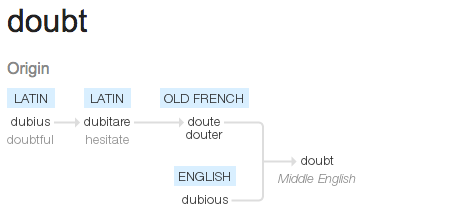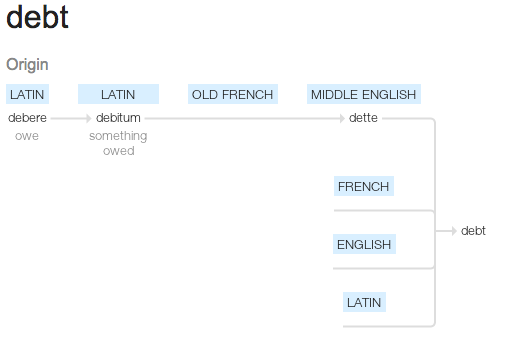Why We Have a Silent B

The English language can be difficult to learn. There are some weird, subtle examples which may leave a new learner in doubt about how pronunciation works. For example, take the previous sentence. There are two words — “subtle” and “doubt” — which if you were to try and spell them phonetically, you’d miss the letter “b,” as the “b” just sits there, silently.
What are those “b”s doing there, anyway?
Blame some 16th century linguists who wanted to reform the English language.
Let’s start with the word “doubt” because the answer is pretty straight forward, although still somehow backward. Google “etymology of doubt” and the search engine may spit back the following chart:

What that says is pretty simple: the English word “doubt” dates back to the 1500s. It comes from the Old French word “doute,” which comes from the Latin words “dubius” and later “dubitare.”Now, pay attention to the disappearing “b.” Somewhere between Latin and Old French, the pronunciation of the term changed; the “b” sound evaporated. The good news for those who spell words the way they sound is that the Old French term didn’t just drop the b sound, but also revised the spelling of the word, dropping the letter “b.” On the other hand, in cases where the “b” sound remained (e.g. “dubious”), the letter “b” came with it. Makes sense, at least if you believe words should be spelled phonetically. And when you think of language reform (okay, you rarely if ever think about language reform, but there are jokes about it), you probably think that aligning the pronunciation of words and their spellings is a step in the right direction.
But the English scholars of the 1500s — at least those who had the power to affect change — didn’t see it that way. Instead, they wanted to align the spelling of words with their etymological roots. As “doute” came from “dubious,” it needed a “b.” And it didn’t really matter much if the spelling and pronunciation didn’t match, especially because not everyone could read and write anyway. So they tossed a silent “b” into the word, coupling it with the “t.” “Doute,” therefore, became “doubt” (and let’s not deal with where that silent “e” went).
The word “debt” follows the same pattern — had a “b,” lost the “b,” got a silent “b” — as seen below:

If that reasoning seems dumb (and no, “dumb” doesn’t follow the same etymological path), well, there are those around today who disagree. As linguist-educator Gina Cooke explains in this TED-Ed talk about the silent “b” in “doubt,” the replacement of the “b” connects “doubt” and “double,” which is important because they have the same root, and if you think about it, having a doubt about something is akin to having two (double!) takes on the same issue. In fact, before English speakers adopted the French word “doute,” they had another word for the same term — “tweogan,” which similarly makes a reference to holding two opinions at once. It’s not hard to see why knowing a word’s origins can help us understand it (and our collective history) better, and it’s similarly not hard to see why we’d want to record a clue about these origins in the words themselves. In those cases, the silent “b” makes some sense. But man, is it annoying.
Bonus Fact: The Middle English-era language reformists weren’t perfect, though. The silent “s” in the word “island,” for example, is just a mistake, plain and simple. The word “island” is from the Old English word “iegland,” the suffix of which (“-land”) you already understand, modifying the word “ieg” which probably meant “island” also. (Yes, the “land” part of “island” is probably redundant.) There’s no “s” in “ieg” so there should be no “s” in “island,” but somewhere along the line, the keepers of the English language made an error. Believing that “iegland” was related to the Old French term “isle” (which comes from the Latin word “insula”), they added a silent “s” to the word in the 15th century. But “island” doesn’t come from “isle” or “insula.” The change, while wrong, stuck.
From the Archives: Oneteen and Twoteen: Why do we call them “Eleven” and “Twelve”?
Take the Quiz: Name the countries with the highest amount of debt as a percentage of GDP, as of 2014. (It’s really hard to find a quiz related to silent consonants, but this one is about “debt,” so, close enough.)
Related: “Dictionary of Word Origins: The Histories of More Than 8,000 English-Language Words.” 4.6 stars on 23 reviews.
